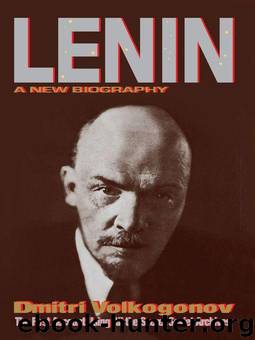Trotsky by Volkogonov Dmitri

Author:Volkogonov, Dmitri [Volkogonov, Dmitri]
Language: eng
Format: mobi, epub
Tags: Autobiography
ISBN: 9780007291663
Publisher: HarperCollins
Published: 1996-01-02T00:00:00+00:00
Lenin's Entourage
From the beginning of his revolutionary career, people were drawn to Lenin. They may have argued and quarrelled with him, but they could not ignore him. By the very force of his personality, he had an influence over people. But he had no bosom friends. In the early years he was close to Martov and N.E. Fedoseev—whom he met only twice—and AA. Vaneev, and he had warm comradely relations with Zinoviev and Kamenev on the eve of the revolution. Later, at various times he was warmly disposed towards Sverdlov, Dzerzhinsky, Podvoisky and Lunacharsky. But there were no lifelong friends. If Lenin showed concern that his close associates were eating properly or getting enough rest, he was doing no more than his Party duty. He might laugh and joke, but he never crossed the line into intimacy with anyone, except Inessa Armand. He was dedicated to The Idea, and such people may have followers and sympathizers, collaborators and disciples, but rarely personal friends.
Many of those who were included in the Politburo formed by Lenin on 10 (23) October 1917 to deal with the issue of the armed uprising went on to play important rôles in creating the system and influencing its development. The Politburo was not, however, a body that manifested itself either during the coup or immediately after it. Lenin had felt that the entire Central Committee could not be readily assembled to debate everyday matters, and that instead a small group of its members should meet on a regular basis to deal with current issues. At the Eighth Party Congress in March 1919 Zinoviev, presenting the report on the organizational question, declared that if the Central Committee were any bigger it would look like a ‘small [mass] meeting’.
The Communist leadership needed a Political Bureau, an Organizational Bureau and a Secretariat. No one imagined that the Political Bureau—Politburo—created at this congress would rapidly accumulate enormous authority and would in time become an organ of absolute power, concealed from the people by a cloak of secrecy and omnipotence.
The composition of the first permanently functioning Politburo, appointed on 25 March 1919, was Lenin, Kamenev, Krestinsky, Stalin and Trotsky, while candidate members were Bukharin, Zinoviev and Kalinin. All of these men, apart from Krestinsky, who remained in the Politburo only until 1921, and Kalinin, who was little more than a decoration, were Lenin's chief assistants. Krestinsky, who was both a ‘Left Communist’ and a ‘Trotskyist’, and who occupied a number of posts in the Central Committee, Sovnarkom and VTsIK, ended his life as a victim of Stalin's purges. A thick volume in the special collection of the Ministry of State Security Archives includes documents on ‘the trial of Bukharin, Rykov, Yagoda, Krestinsky’, with a half-page attached noting that the sentence on Krestinsky was carried out on 15 March 1938.1
Kalinin was more fortunate. Appointed Chairman of the VTsIK by Lenin on Sverdlov's death in March 1919, until his natural death in 1946 he played the part of a dummy head of state, and had no influence whatever on the fate of the country.
Download
This site does not store any files on its server. We only index and link to content provided by other sites. Please contact the content providers to delete copyright contents if any and email us, we'll remove relevant links or contents immediately.
| Africa | Asia |
| Canadian | Europe |
| Holocaust | Latin America |
| Middle East | United States |
Fanny Burney by Claire Harman(25808)
Empire of the Sikhs by Patwant Singh(22202)
Out of India by Michael Foss(16326)
Leonardo da Vinci by Walter Isaacson(11944)
Small Great Things by Jodi Picoult(6121)
The Six Wives Of Henry VIII (WOMEN IN HISTORY) by Fraser Antonia(4810)
The Wind in My Hair by Masih Alinejad(4437)
The Lonely City by Olivia Laing(4137)
The Crown by Robert Lacey(4125)
A Higher Loyalty: Truth, Lies, and Leadership by James Comey(4051)
The Iron Duke by The Iron Duke(3663)
Millionaire: The Philanderer, Gambler, and Duelist Who Invented Modern Finance by Janet Gleeson(3591)
Sticky Fingers by Joe Hagan(3464)
Alive: The Story of the Andes Survivors by Piers Paul Read(3329)
Papillon (English) by Henri Charrière(3292)
Joan of Arc by Mary Gordon(3281)
Stalin by Stephen Kotkin(3103)
Aleister Crowley: The Biography by Tobias Churton(3038)
Ants Among Elephants by Sujatha Gidla(2937)
